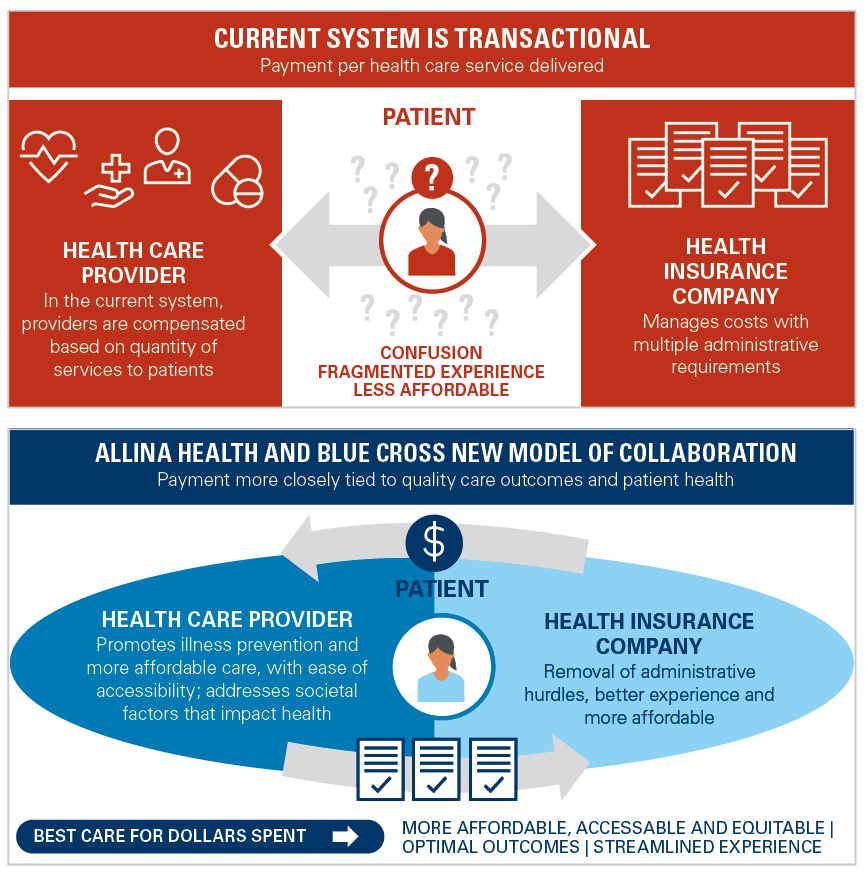For too long, health care has been overly complex, challenging to navigate, and difficult to afford for many people.
Blue Cross has long been committed to changing that — clearing common obstacles on the path to wellness and allowing members to receive the care they need to live their best lives. You might have noticed this shift in recent years, both in the care you receive and how that care is covered. If you haven’t, you likely will soon. It’s an approach known as valuebased care and it’s fast-becoming a foundation for a better overall health care experience.
WHERE’S THE VALUE?
Simply put, a value-based model focuses on paying based on the outcomes of services, along with the overall health of patients receiving them. That’s opposed to paying purely for the quantity of services provided (such as tests, scans, surgeries, etc.).
The shift to value-based care means a greater emphasis on initiatives Blue Cross has already focused on for years, particularly with Medicare members. Those include preventive screenings rather than responsive treatment, getting care at the right time and location (urgent care vs. emergency room, for example), and reducing unnecessary care.
These types of changes require close collaboration with providers. Several recent agreements are a testament to our partners’ eagerness to move in this direction.
“Incremental change has been holding the health care industry back for too long,” says Dr. Kevin Croston, CEO of Memorial Health, which has embraced the value-based approach. “The industry is moving too slow, so we are taking bold action to create a transformative solution that is consumer friendly, improves the quality of care and delivers outcomes that are measurably better than others.”
Here are a few examples of how the value-based model is changing care for the better among several providers:
Allina Health
A six-year agreement with Allina is aimed at significantly improving health care affordability. Of many changes to come, a few include expanded care coordination to improve member guidance and support, increasing sites for affordable care, and continued expansion of virtual care offerings, including a new Home Hospital program.
Winona Health
Blue Cross is working with Winona Health to address patient needs related to the social determinants of health, a set of basic needs that also includes living conditions, available resources, societal support and social structures. A Food as Medicine program for patients with diabetes, and the development of a community health action plan for immigrant families are examples of related efforts.
North Memorial Health
Increased telehealth visits, the ability to check in from vehicles, and web-based technology that lets patients notify urgent care when they are on their way are all initiatives aimed at reducing contact, minimizing waits, and improving the patient experience. North Memorial has also placed an emphasis on price transparency and more predictability of medical costs.
WHAT IT MEANS FOR YOU
As Blue Cross continues to work with providers on more value-based initiatives, you might notice changes to your care offerings. Those might include more promotion or discussion of preventive services, opportunities to receive care in your home, or access to programs that can help provide fitness, healthy food access or other support.
If value-based care is working the way it should, members should receive more upstream care and get connected with the right providers and specialists to keep health complications at bay. The results should be better care and support that leads to improved outcomes and a reduction of past challenges, such as unnecessary care or hospital readmissions. On the financial side, the shift should slow the dramatic rise of health care costs we have experienced in recent years.
Dr. Craig Samitt, CEO of Blue Cross and Blue Shield of Minnesota, calls it a win for everyone.
“If the patient is healthier, if the quality is higher, if the service improves, and if we’re able to bend the cost curve for the people we serve,” he says, “then we all benefit from that.”



